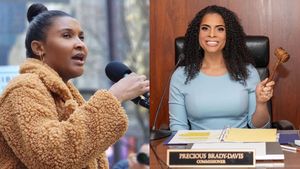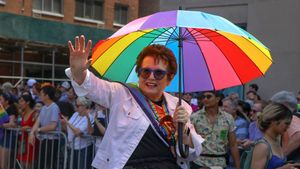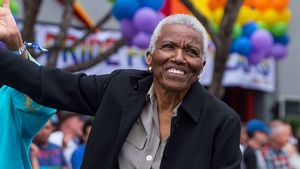What if a popular 18th-century folk hero and rebel, more popular than the Queen, was in actual fact a trans man? In Britain, the 1724 execution of Jack Sheppard, a legendary jail-breaker, drew 200,000 people -- about a third of the city's population. His exploits have been revived intermittently ever since, including in last year's novel The Fatal Tree, by the gay British author Jake Arnott. Now comes Jordy Rosenberg with a more radical thesis, overlaying Sheppard's daring escapes with a powerful queer subtext: what if Sheppard were trans, and his lover, Bess, the daughter of a mixed-race marriage? Layered with the raucous street life of 17th-century London, Confessions of a Fox is a punchy picaresque that is simultaneously a manifesto for rethinking, and reimagining, history. Sheppard's story is footnoted by a contemporary scholar of transgender theory, R. Voth, who has stumbled on a "memoir" that purports to tell the rebel's tale. It's Voth's footnotes, addressing queer erasure and the dynamics of storytelling, that give context to this gripping adventure story.
Rosenberg, himself a scholar of transgender theory and 18th-century literature, sat down with his friend Maggie Nelson, author of The Argonauts -- a mesmerizing exploration of language and gender identity -- to chat about who gets to write stories, and what is erased in the process.

OUT: I'm curious how historical fiction can be used to reclaim queer narratives.
Jordy Rosenberg: Well, the book is based on this real historical person, Jack Sheppard, a very famous prison break artist who in the 18th century was better known than the Queen, and his confrontation with Jonathan Wild, who was the creator of the first London municipal police force. If you go back to historical documents from the period, there were a lot of news broadsides written about him, but also fake news broadsides, and letters that were written as him from the underworld after he was executed, and they always represented him as very genderqueer. He was, as far as everyone knows, a cis male, but he was always represented in a genderqueer way -- being able to find his way out of prison because of his smallness and wiliness -- and that was integral to his roguishness. It felt important to be able to write transgender historical fiction that didn't have to take on some of the case histories, or authenticity that's demanded of transgender writers today. But I think there's a political point in being able to say that people also like to write imaginative fiction that doesn't always have to correspond to the demands of a medicalizing gaze. It's equal fidelity to the history of genderqueerness, and also to the ability of us, in the present, to be able to write imaginative fiction.

Maggie Nelson: I saw an earlier part of your book, and it didn't have the footnotes form that the published version has. When did that come in?
JR: It did have a footnotes section but they were like giant, explanatory footnotes. At some point, I had a dark night of the souls when I realized you couldn't write a book with footnotes without incorporating that into the narrative of the novel itself. I wanted to write a slightly more unhinged voice so halfway through I revamped everything and put in a much, much larger footnotes section with this whole new character basically losing his shit, and I thought, They're going to kill me, they're going drop the book, they're going to freak out. But they wanted more.
OUT: What is important for you to convey in your books about gender identity and the way it's evolved?
MN: The most ostentatiously genderfluid, or genderqueer person in The Argonauts is my partner Harry, but the book is very much from my point of view and doesn't really attempt to speak for him, except when I let him speak for himself -- in certain passages, such as one about the death of his mother, or certain elements of dialogue for which he gave his OK. The Argonauts takes a more maximalist approach about identity in general. I think about everything in the book as holding that place, whether its talking about being in drag as a pregnant person or whatever. Everyone, I believe, is given a complicated gender and sexuality.
JR: I was trying to cast backwards this question about the way in which transgender and queer embodiment, specifically, can't be thought outside of these other historical forces like the birth of the prison system, the onset of British imperialism. There's a broader point here, too, which has to do with the fact that the contradictions of our world can't be resolved in aesthetic form. If they could be, I would just write a very short novel that had one sentence that said, "Racism and capitalism are over." That would be the novel, but the thing about aesthetic production is that it sits at the interstices of what cannot be resolved in writing, and what has to be given form nonetheless.
Maggie, you're probably sick of talking about this, but how do you write sexy, bitchin' prose without tipping over into writing for prurient readers who just wants a spectacularized glimpse? I just came across this book by this incredible science fiction fantasy writer, Sofia Samatar -- she describes it as a speculative memoir. It's called Monster Portraits, and, in it, Samatar says that monsters have a horror of the camera, but they will allow their portraits to be drawn by hand. I kept thinking about that. I feel so aligned with this point that she's making, that has to do with striving for forms of writing that are about elided or suppressed or oppressed forms of sensation and touch. What are the endeavors to write about what has been deemed monstrous in a way, like coaxing out certain aspects of ourselves into the intimacy of language, aspects that we might not want to be frozen on film?
MN: That's such a great quote. I think what Jordy's describing is that representation is also a form of fixative -- at times positive, at times corrosive and uneven, and sometimes even a nefarious relationship to social justice or lived experience, free of violence. Once you know that's the case and you're not in this Hollywood pink cloud about representation being the answer to all our problems, that's a starting point. And it doesn't lead to a depression, necessarily, that nothing can be said. It just means that that contradiction is going to be in what you say.
Personally, I've found that writing a book [The Argonauts] that was very focused on contradictions -- and these contradictions about representation have created many spaces of solidarity in places I've been, and people who feel ironically represented in non-representation -- has been really important. I'm sure that Jordy's heard this before, too, but if you come from the academic world and then you move into other forms of publishing, everyone's like, "Don't use the word 'nuanced;' don't use the word 'meditation.'" You're not supposed to be using all these words where academia privileges a lot of contradiction. When The New York Times wants you to write an op-ed, they don't want you to write the English academic code for "nuance," but that's why I don't do op-eds, because I can't create, in short spaces meant for other readers, the world that Jordy's describing, where a lot of different conflicting impulses might be held in a singular piece.
JR: That's beautiful. As a baseline, representation and political struggle are just not the same thing, but that does not mean there aren't politics to representation. For me, it's important to have commitments, or writing becomes a glut of meaningless unreality, and that's tiresome. There was this line that was playing over in my head when I was writing the book: "Some unrealities we fight for, and some we fight against," and it was helpful to me to come up with that because, first of all, not everything is available for speculative-ness and fantastical-ness or unreality. Unreality has a long and often not always consensual history for people from marginalized positions. There's a particular kind of unreality that's being forced upon queer and trans people, but what I was interested in was metabolizing some of that painful unreality in writing, and going deeper into the experience and history of that unreality.
OUT: What have you learned about queerness and gender identity in the 18th century in the process of writing and researching this novel?
JR: A lot of this intersects with these questions around the politics of archives and questions around what do you do with them. They are vast, but obviously there's a politics to what's saved and what isn't, what is written by who, and where, and what wasn't; and so, I think again we can't fetishize the archive -- we have to find ways around what's missing. But for this book, I did draw on a number of intersecting histories. To be able to reconstruct this world and imagine beyond what we know about it, it was important to research the history of the 18th-century London underworld. I studied the 18th-century, and even earlier, origins of modern sexology, like early textbooks on the history of the medicalization of gender nonconformity. Some of the characters are based on famous 18th-century assholes who were basically spectacularizing their case studies. James Parsons would be the most famous one. He wrote a book called A Mechanical and Critical Inquiry into the Nature of Hermaphrodites in 1741, but a lot of his so-called medical claims were based on studies of enslaved and captured people. So, here's a way in which this history of sex and gender and queerness and trans-ness is really inextricable from the history of slavery and materialism. We can't separate these things. It's not always a happy history, and part of what I'm trying to do with the book is to weave together these records of horrible, baleful histories with what has been a very utopian, indeed a sort of magical undercurrent, that I felt was very important.
OUT: A real signature of Maggie's writing is how naked you can be, like David Wojnarowicz for example, and How did you discover that that was a mode in which you thrived?
MN: My heroes, coming of age, were people like Wojnarowicz. I read Wojnarowicz's Close to the Knives, and carried it everywhere with me, made a chapbook out of it in letterpress press, would go to New York and try to find out where he went. But because the stakes were so high and because Wojnarowicz was able to access so much anger and so much energy, and because I have a more academic and privileged background than he does, I just never heard my writing as a kind of roar from the wilderness. So, it surprises me when people feel like my writing's very raw. It feels very cooked to me. On the other hand, I would just say that I have a "circle the wound" personality, so I go for things that are the most painful or the most hot in their difficulty, and I always have, and it's just a feature of who I am. I think of it more as a compulsion than bravery.

JR: Obviously, Maggie's writing may appear to be raw but one of its elegant tricks is that it's really refusing to disclose truths in an easily legible way, mediated through form and aesthetic. One of the things that I went back and forth about many times is that 18th-century pornographic writing is very body-oriented. There's a lot of sex scenes in my novel and I thought, Well, I don't want to showcase the transgender body for a wide readership and I don't want to pander to a prurient gaze but that resulted in a situation where every single scene was hugely metaphorical, like no one had any idea what was happening. I started to get really pissed-off halfway through, and I am so bound up in these 1800 texts -- Tristram Shandy was actually a very big model for me, and also a hated object. I do love it, but I just thought, Well, why the hell does Laurence Stern get to go on for 800 pages, about castration, and I'm not able to talk about things that I want to talk about? I tried to deal with that, ultimately, at the level of form, so in the novel the characters don't disclose a lot about their bodies, but the [character of the] editor has an erotic need to do so, and I thought it was that character's right to do so. I started to feel constrained about how anxious I was to not represent transgender bodies and then I just thought, Well, I have a transgender body, and why do cisgender people get to have some like relations with their bodies when they write? But I didn't want to stigmatize the difficulty of that, and the trouble within that, and the issues that come up around that. This is back to the theme of nakedness -- which is never really naked.














































































